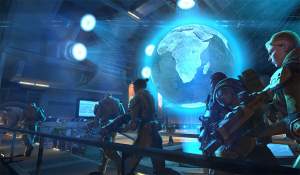Review by Ian Abbott

After a worldwide alien invasion, the fate of the human race is at risk. I’d been tasked with unifying and protecting the Earth’s governments, forming an elite military organisation (Extraterrestrial Combat Unit) and combining research programmes of alien technologies to neutralise the threat whilst building an operational base and preparing for heavy combat missions.
From the very first moment I felt a constant duty to ease panic and defend the entire world. I now realise that as a gamer I thrive on responsibility and genuine power. In hindsight, during my first play through I was reacting to fires and trying to stampede through the game rather than plan strategically and build an experienced base of soldiers which ultimately resulted in failure. I lost the support of too many countries and they withdrew their funding from the council. The mission ended. It was at this point that my XCOM addiction kicked in. I’d become used to games not allowing me to fail, to constantly assist me through continuous respawns, guided paths or unlimited ammo. XCOM represents an alternative, a game which tested my skill but treated me fairly and happily rewarded or punished decisions I’d made without letting me undo them.
The game excels at both strategy and combat. From my base (the anthill) I lead a team of scientists (responsible for analysing the aliens and their technology from crash sites/corpses that I scavenged) and engineers (who translate the scientists’ preliminary work and realise it in new armour, vehicles or weapons), both of whom equip my base, soldiers and aircraft with kit that suits my style of play. It is this level of investment and choice of pathway which has helped grow my attachment to the game.

The only lowlights are a soundwave that pops up clearly indicating the direction of the aliens that interrupts the measured pace and discovery of a territory as my international platoon steadily move through the mission, slowly uncovering the fog of war and the rare occasion in which different missions use the same map. As I chalk up multiple kills and mission completions, multiple ability upgrades become available for my soldiers. Therefore if I choose to take two assault class on a mission with me, their skill tree could be entirely different. There is a deep satisfaction to be gained from learning how to build a roster of 15 soldiers and rotate personnel to keep everyone progressing, not to just have a crack team of 6 soldiers with a 100 kills between them. If two or three of them die during a particularly demanding mission, I have to replace them with rookies who often panic and have poor aim and defence stats.

I’ve not played the original XCOM or any of the other mid 90s iterations from the franchise and so come at this with no history or attachment to the series. Even though the developer, Firaxis Games did not have a nine figure budget, it is one of the most consistently engaging titles I’ve ever played, am still playing and will play again and again and again. I’m surprised and delighted that a turn based strategy game can stand toe to toe with The Witcher 2 and Lollipop Chainsaw as my richest and most rewarding video game experiences of 2012.